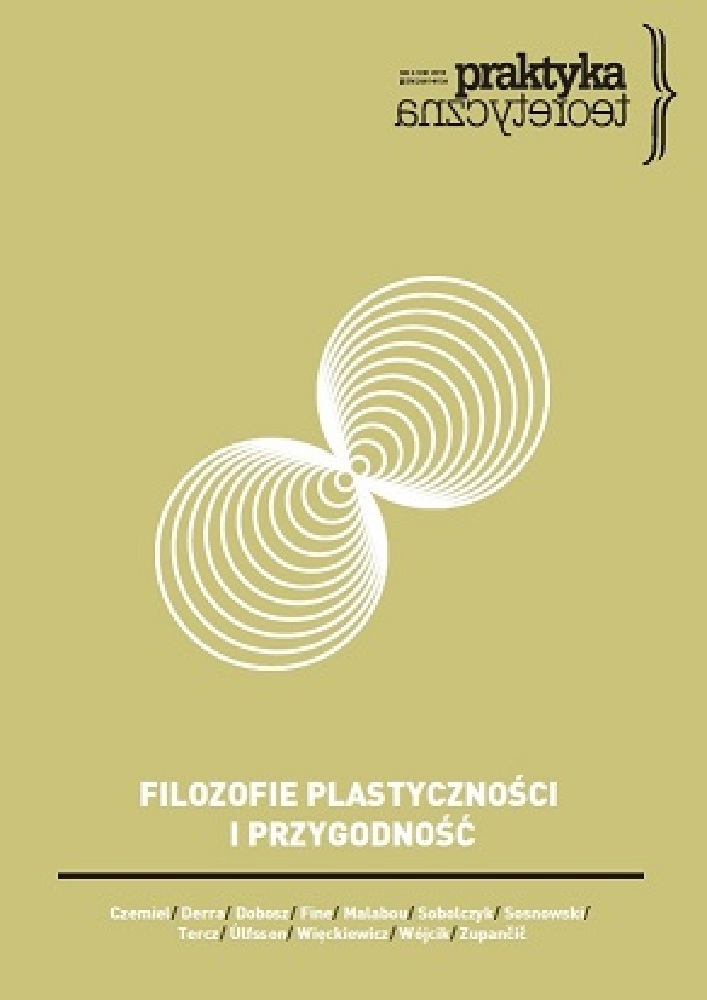Abstract
In spite of popular interpretation of Gilles Deleuze’s philosophy as a kind of postmodernism, poststructuralism or Nietzscheanism, this paper reveals its deep rooting in the transcendental idealism of Immanuel Kant. According to the main thesis, it was Kant who delivered the primary source of philosophical schemes that inspired both the early (expressed mainly in Difference and Repetition, 1986), and late period of Deleuze’s work, starting with the first volume of Capitalism and Schizophrenia called Anti-Oedipus, written in collaboration with Félix Guattari (1972). The main part of the essay contains contextual analysis of the latter. In Anti-Oedipus Deleuze and Guattari propose the concept of desire (unconscious) as a power capable of constituting nomadic subjectivity, characterized by the openness to difference, creativity, and drawing strength from social diversity. However, they note that a desire is characterized by a tendency to undergo internal illusions and, as a result, to block its own revolutionary and creative possibilities. That is why, say Deleuze and Guattari, it is necessary to carry on the critique of pure unconsciousness, whose aim is to reveal these illusions and perhaps to free us from themReferences
Alliez, Éric i Andrew Goffey (red.). 2011. Guattari Effect. London–New York: Continuum.
Bednarek, Joanna i Dawid Kujawa. 2017. „Jak dziś szukać linii ujścia?: Wstęp”. Praktyka Teoretyczna 3: 325–330.
Bergson, Henri. 2016. O bezpośrednich danych świadomości. Tłum. Karolina Bobrowska. Warszawa: Aletheia.
Buchanan, Ian. 2008. Deleuze and Guattari’s „Anti-Oedipus”: A Reader’s Guide. London–New York: Continuum.
Deleuze, Gilles. 1997. Różnica i powtórzenie. Tłum. Bogdan Banasiak i Krzysztof Matuszewski. Warszawa: KR.
Deleuze, Gilles. 1999. Filozofia krytyczna Kanta: Doktryna władz. Tłum. Bogdan Banasiak. Gdańsk: słowo/obraz terytoria.
Deleuze, Gilles. 2002. „Gilles Deleuze parle de la philosophie”. W Deleuze, Gilles. L’île déserte et autres textes: Textes et entretiens 1953–1974. Paris: Minuit: 298–301.
Deleuze, Gilles. 2003. „Préface pour l'édition italienne de Mille Plateaux”. W Deleuze, Gilles. Deux régimes de fous. Textes et entretiens 1975–1995. Paris: Minuit: 288–290.
Deleuze, Gilles. 2011. Logika sensu. Tłum. Grzegorz Wilczyński. Warszawa: PWN.
Deleuze, Gilles. 2012. Nietzsche i filozofia. Tłum. Bogdan Banasiak. Łódź: Officyna.
Deleuze, Gilles. 2016. Krytyka i klinika. Tłum. Bogdan Banasiak i Paweł Pieniążek. Łódź: Officyna.
Deleuze, Gilles i Félix Guattari. 2003. „Mai 68 n'a pas eu lieu”. W Deleuze, Gilles. Deux régimes de fous. Textes et entretiens 1975–1995. Paris: Minuit: 215–217.
Deleuze, Gilles i Félix Guattari. 2015. Tysiąc plateau: Kapitalizm i schizofrenia, tom 2. Tłum. anonimowe. Warszawa: Fundacja Bęc Zmiana.
Deleuze, Gilles i Félix Guattari. 2016. Kafka: Ku literaturze mniejszej. Tłum. Anna Zofia Jaksender i Kajetan Maria Jaksender. Kraków: Wydawnictwo Eperons-Ostrogi.
Deleuze, Gilles i Félix Guattari. 2017. Anty-Edyp: Kapitalizm i schizofrenia, tom 1. Tłum. Tomasz Kaszubski. Warszawa: Wydawnictwo Krytyki Politycznej.
Descombes, Vincent. 1996. To samo i inne: Czterdzieści pięć lat filozofii francuskiej (1933–1978). Tłum. Bogdan Banasiak i Krzysztof Matuszewski. Warszawa: Spacja.
Foucault, Michel. 1977. „Przedmowa do Anty-Edypa”. Ekologia i sztuka. http://www.ekologiasztuka.pl/articles.php?article_id=27.
Genosko, Gary (red.). 2012. Deleuze Studies 6.2.
Freud, Sigmund. 2000. Dwie nerwice dziecięce. Tłum. Robert Reszke. Warszawa: KR.
Gusin, Michał. 2015. „Chaosmos Guattariego”. Kronos 4: 5–13.
Herer, Michał. 2006. Gilles Deleuze: Struktury – Maszyny – Kreacje. Kraków: Universitas.
Holland, Eugene W. 1999. Deleuze and Guattari „Anti-Oedipus”: Introduction to Schizoanalysis. London–New York: Routledge.
Holland, Eugene W. 2013. Deleuze and Guattari’s „A Thousand Plateaus”: A Reader's Guide. London–New York: Bloomsbury.
Kant, Immanuel. 2001. Krytyka czystego rozumu. Tłum. Roman Ingarden. Kęty: Antyk.
Kant, Immanuel. 2002. Krytyka praktycznego rozumu. Tłum. Benedykt Bornstein. Kęty: Antyk.
Kant, Immanuel. 2004. Krytyka władzy sądzenia. Tłum. Jerzy Gałecki. Warszawa: PWN.
Kerslake, Christian. 2010. Immanence and the Vertigo of Philosophy: From Kant to Deleuze. Edinburgh: Edinburgh University Press.
Massumi, Brian. 1996. A User’s Guide to Capitalism and Schizophrenia: Deviations from Deleuze and Guattari. Cambridge, MA: The MIT Press.
Mrówka, Adrian. 2017. „Félix Guattari, krytyka psychoanalizy i przypadek La Borde”. Praktyka Teoretyczna 3: 331–341.
Patton, Paul. 1997. „Introduction”. W Deleuze: A Critical Reader, red. Paul Patton. Oxford: Blackwell: 1–17.
Potkański, Jan. 2017. „Dialektyka Deleuze’a: Prehistoria, perwersja, polityka”. Machina Myśli. http://machinamysli.org/dialektyka-deleuzea-prehistoria-perwersja-polityka/.
Russon John. 2013. „Desiring Production and Spirit: On Anti-Hegel and Deleuze”. W Hegel and Deleuze: Together Again for the First Time, red. Karen Houle i Jim Veron. Evanston, IL: Northwestern University Press: 152–173.
Smith, Daniel W. 2004. „The Inverse Side of the Structure Žižek on Deleuze on Lacan”. Project MUSE 4.46: 635–650.
Voss, Daniela. 2011. „Maimon And Deleuze: The Viewpoint of Internal Genesis and The Concept Of Differentials”. Parrhesia 11: 62–74.
License
“Theoretical Practice” seeks to put into practice the idea of open access to knowledge and broadening the domain of the commons. It serves the development of science, thinking and critical reflection. The journal is published in open-access mode under the CC-BY-NC-SA 4.0 license (detail available here: http://creativecommons.org/licenses/by-nc-sa/4.0/). Articles published in the journal may be freely distributed, stored, printed and utilized for academic and teaching purposes without restrictions.
They should not be, however, used for any commercial purposes or be reconstructed into derivative creations. Access to the journal may not be limited or offered for a fee by any third party.
Prospective authors are obliged to fill in, sign and send back the publishing contract compliant with the CC licencing. [PL.pdf, PL.doc, EN.pdf,EN.doc].
According to this contract, authors grant the journal a non-exclusive right to publish their work under the creative commons license (CC-BY-NC-SA 4.0) without any financial obligation on both sides of the contract.
Before submission authors should make sure that derivative materials they use are not protected by copyright preventing their non-commercial publication. Authors are responsible for any respective copyright violations.
